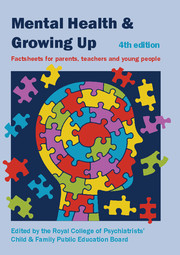Book contents
- Frontmatter
- Contents
- Contributors
- Factsheets for young people
- Factsheets for parents, carers and anyone who works with young people
- 1 Good parenting
- 2 The restless and excitable child
- 3 Dealing with tantrums
- 4 Children who soil or wet themselves
- 5 Sleep problems in childhood and adolescence
- 6 Behavioural problems and conduct disorder
- 7 Attention-deficit hyperactivity disorder (ADHD)
- 8 The child with general learning disability
- 9 Specific learning difficulties
- 10 Autism and Asperger syndrome
- 11 Depression in children
- 12 Worries and anxieties: helping children to cope
- 13 Divorce or separation of parents: the impact on children and adolescents
- 14 Death in the family: helping children to cope
- 15 The emotional cost of bullying
- 16 Traumatic stress in children
- 17 Domestic violence: its effects on children
- 18 Child abuse and neglect: the emotional effect
- 19 Drugs and alcohol: what parents need to know
- 20 Self-harm in young people
- 21 Psychosis
- 22 Schizophrenia
- 23 Bipolar disorder in children and adolescents
- 24 Obsessive–compulsive disorder in children and young people
- 25 Eating disorders in young people
- 26 Chronic physical illness: the effects on mental health
- 27 Medically unexplained physical symptoms
- 28 Chronic fatigue syndrome: helping your child get better
- 29 Parental mental illness: the problems for children
- 30 Who's who in CAMHS
20 - Self-harm in young people
from Factsheets for parents, carers and anyone who works with young people
Published online by Cambridge University Press: 02 January 2018
- Frontmatter
- Contents
- Contributors
- Factsheets for young people
- Factsheets for parents, carers and anyone who works with young people
- 1 Good parenting
- 2 The restless and excitable child
- 3 Dealing with tantrums
- 4 Children who soil or wet themselves
- 5 Sleep problems in childhood and adolescence
- 6 Behavioural problems and conduct disorder
- 7 Attention-deficit hyperactivity disorder (ADHD)
- 8 The child with general learning disability
- 9 Specific learning difficulties
- 10 Autism and Asperger syndrome
- 11 Depression in children
- 12 Worries and anxieties: helping children to cope
- 13 Divorce or separation of parents: the impact on children and adolescents
- 14 Death in the family: helping children to cope
- 15 The emotional cost of bullying
- 16 Traumatic stress in children
- 17 Domestic violence: its effects on children
- 18 Child abuse and neglect: the emotional effect
- 19 Drugs and alcohol: what parents need to know
- 20 Self-harm in young people
- 21 Psychosis
- 22 Schizophrenia
- 23 Bipolar disorder in children and adolescents
- 24 Obsessive–compulsive disorder in children and young people
- 25 Eating disorders in young people
- 26 Chronic physical illness: the effects on mental health
- 27 Medically unexplained physical symptoms
- 28 Chronic fatigue syndrome: helping your child get better
- 29 Parental mental illness: the problems for children
- 30 Who's who in CAMHS
Summary
Why do young people harm themselves?
Some young people use self-harm as a way of trying to deal with very difficult feelings that build up inside them. This is clearly very serious and can be life-threatening. People say different things about why they do it.
• Some say that they have been feeling desperate about a problem and don't know where to turn for help. They feel trapped and helpless. Self-injury helps them to feel more in control.
• Some people talk of feelings of anger or tension that get bottled up inside, until they feel like exploding. Self-injury helps to relieve the tension that they feel.
• Feelings of guilt or shame may also become unbearable. Selfharm is way of punishing oneself.
• Some people try to cope with very upsetting experiences, such as trauma or abuse, by convincing themselves that the upsetting event(s) never happened. These people sometimes feel ‘numb’ or ‘dead’. They say that they feel detached from the world and their bodies, and that self-injury is a way of feeling more connected and alive.
• A proportion of young people who self-harm do so because they feel so upset and overwhelmed that they wish to end their lives by dying by suicide. At the time, many people just want their problems to disappear, and have no idea how to get help. They feel as if the only way out is to kill themselves.
Who is at risk?
An episode of self-harm is most commonly triggered by an argument with a parent or close friend. When family life involves a lot of abuse, neglect or rejection, people are more likely to harm themselves. Young people who are depressed, or have an eating disorder, or another serious mental health problem, are more likely to self-harm. So are people who take illegal drugs or drink too much alcohol.
Many young people who self-harm with a wish to die by suicide also have mental health or personality difficulties; often the suicide attempt follows a stressful event in the young person's life, but in other cases, the young person may not have shown any previous signs of difficulty.
Sometimes the young person is known to have long-standing difficulties at school, home or with the police. Some will already be seeing a counsellor, psychiatrist or social worker.
- Type
- Chapter
- Information
- Mental Health and Growing UpFactsheets for Parents, Teachers and Young People, pp. 105 - 108Publisher: Royal College of PsychiatristsPrint publication year: 2013



